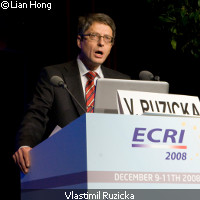Czech Republic prepares to take over EU Presidency
At the end of the year, the French Presidency of the EU will draw to a close and the Czech Republic will take over the reins for the first time since it joined the EU in 2004. Speaking to the press at the European Conference on Research Infrastructures (ECRI2008) in Versailles, France, the French Minister for Higher Education and Research, Valérie Pécresse, noted some of the highlights of the past six months, while her Czech counterpart, Vlastimil Ruzicka, presented his country's plans in the fields of higher education and research for the first half of 2009. Among other things, the French have overseen the adoption of a number of important policies designed to strengthen the European Research Area (ERA). These include the 'joint programming' initiative, which aims to enhance cooperation between national research funding programmes. 'The first programme will be on Alzheimer's and other neurodegenerative diseases,' Mrs Pécresse told journalists, adding that nine countries had already expressed an interest in working together on this issue, which was one of the French presidency's priorities. Agreement was also reached on an initiative to boost researcher mobility and a European strategy for international cooperation in research. Under France's presidency, Europe's research ministers also agreed on a vision for European research in 2020, in which the ERA is open to the world, responds to society's needs and drives Europe's competitiveness. The French also succeeded in gaining widespread support for the Commission's proposed legal framework for pan-European research infrastructures. However, one area of contention is the issue of whether pan-European research infrastructures should be exempt from VAT (value added tax). This thorny issue will now be handed over to the Czech presidency. The Czechs will take over the presidency of the EU in the new year. Vlastimil Ruzicka, Vice-Minister for Education, Youth and Sports, explained that his country had three priorities in the higher education and research fields. Firstly, the country will organise a conference to launch a debate on the impacts of research coordination via the EU's framework programmes. 'We wish to find out the impact of the Sixth Framework Programme on the economy,' he told CORDIS News, adding that around 300 people from a range of fields would be invited to the conference. Another priority for the presidency is the greater use of structural funds to finance research infrastructures and strengthen the ERA. The Czechs are keen to ensure that the top European research infrastructures are distributed evenly across Europe, and not concentrated exclusively in a few, larger countries. For its part, the Czech Republic plans to bid to host the ELI (Extreme Light Intensity) short pulse laser. 'The Czech Republic is strong in this field,' Mr Ruzicka told CORDIS News. 'We have the facilities and the expertise.' The third priority for the Czechs is to encourage greater researcher mobility. This ties in neatly with the Czech presidency motto: 'Europe without barriers'. Research and research cooperation are also pivotal to the Czech presidency's wider priorities: economy, energy and external relations, as well as the Czech plans to uphold the so-called 'fifth freedom': the free movement of information and knowledge.
Countries
Czechia, France



